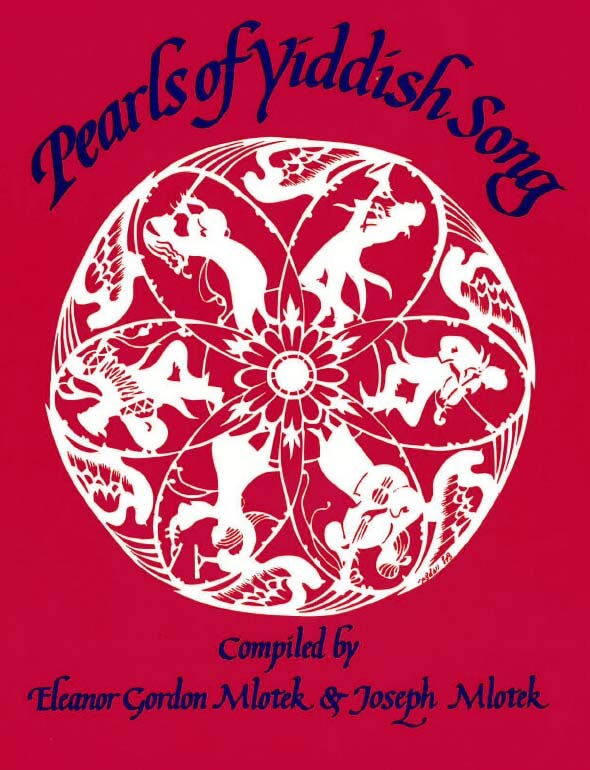Folksong. Textual variant published in 1901 by S. Ginsburg and P. Marek; words and music published by M. Kipnis in 1918. This is one of the songs that noted Yiddish writer Yitskhok Leybush Peretz (1852-1915), one of the first collectors of Yiddish folksongs, collected in 1894-95 (cf., Cahan, Shtudyes).

Momma, my love, my crown, my dear heart,
please be silent for a little while.
Put out the hellish fire in me
and give me the one I want.
I’ve fallen in love with a fine boy
lovely as a gold coin.
It’s him, Momma, I have loved
and him I wanted.
We went strolling, darling mother, together
up and down the boulevard;
all the girls have sweethearts
and I’ve been left behind like a fool.
We went strolling, darling mother, together
all around on the grass.
How appalled you were by me
Oh my God, I don’t know why!
It was a dream, dear father, a dream, dear mother,
it was like a dream to me;
His fine cheeks and his dark eyes
made me sick with love!
Trees bloom, and the years fly by,
time passes like smoke;
Oh, since I first knew of his love,
I have grown weak from crying.
Mamenyu, lyubenyu, kroynele, hartsele,
Shvayg shoyn a vaylinke shtil!
Lesh in mir mayn helishn fayer
Un gib mir shoyn vemen ikh vil!
Ikh hob zikh ayngelibt in a sheyn yingele,
Sheyn vi a rendl gold.
Im, mamenyu, hob ikh gelibt
Un im hob ikh take gevolt.
Shpatsirn, dushe-lebn, zaynen mir gegangen
Arum un arum dem bulvar;
Ale meydelekh shpiln libes,
Un ikh bin geblibn tsu nar.
Shpatsirn, dushe-lebn, zaynen mir gegangen
Arum un arum dem groz,
Vos far an umkheyn hostu oyf mir gevorfn,
Gevald, ikh veys nit far vos!
A kholem, tatenyu, a kholem, mamenyu,
A kholem hot zikh mir gedakht;
Zayne sheyne bekelekh, mit di shvartsinke
eygelekh
Hobn mikh krank gemakht!
Di beymelekh blien, di yorelekh flien,
Di tsayt geyt avek mitn roykh;
Oy, zint ikh hob zayn libe derkent,
Fun veynen hob ikh shoyn keyn koykhl
מאַמעניו, ליובעניו, קרױנעלע, האַרצעלע,
שװײַג שױן אַ װײַלינקע שטיל!ּ
לעש אין מיר מײַן העלישן פֿײַער
און גיב מיר שױן װעמען איך װיל!
איך האָב זיך אײַנגעליבט אין אַ שײן ייִנגעלע,
שײן װי אַ רענדל גאָלד.
אים, מאַמעניו, האָב איך געליבט
און אים האָב איך טאַקע געװאָלט.
שפּאַצירן, דושע־לעבן, זײַנען מיר געגאַנגען
אַרום און אַרום דעם בולװאַר;
אַלע מײדעלעך שפּילן ליבעס,
און איך בין געבליבן צו נאַר.
שפּאַצירן, דושע־לעבן, זײַנען מיר געגאַנגען
אַרום און אַרום דעם גראָז;
װאָס פֿאַר אַן אומחן האָסטו אױף מיר געװאָרפֿן,
געװאַלד, איך װײס ניט פֿאַר װאָס!
אַ חלום, טאַטעניו, אַ חלום, מאַמעניו,
אַ חלום האָט זיך מיר געדאַכט;
זײַנע שײנע בעקעלעך, מיט די שװאַרצינקע אײגעלעך
האָבן מיך קראַנק געמאַכט!
די בײמעלעך בליִען, די יאָרעלעך פֿליִען,
די צײַט גײט אַװעק מיטן רױך;
אױ, זינט איך האָב זײַן ליבע דערקענט,
פֿון װײנען האָב איך שױן קײן כּוח!
Song Title: Mamenyu, Lyubenyu

First published in 1988 as Pearls of Yiddish Song: Favorite Folk, Art and Theatre Songs, this anthology contains 115 songs. Some material had never been published, while others, included in rare song collections or sheet music, were largely inaccessible. The songs presented reflect Jewish life in Eastern Europe and the United States and depict childhood, love, family celebrations, poverty, work and struggle. There are also songs from the Hasidic and Maskilic movements, songs of Zion and of America, as well as songs from the Yiddish theater.
The title of this anthology derives from the weekly two-page feature column “Pearls of Yiddish Poetry,” which the compilers Yosl and Chana Mlotek initiated in 1970 in the Yiddish newspaper Der Forvertz (the Yiddish Daily Forward). Hundreds of readers from around the world — including authors, composers, singers, actors — became co-participants in this collective folk project and recalled melodies, lines, fragments, stanzas and their variants of songs, poems, and plays which they had heard in their youth. At first, readers sent in only written material. Later, they also taped songs on cassettes, many of whose melodies had, until then, never been recorded. They also identified and supplied missing information regarding lyricists, poets, and composers and described the circumstances surrounding the songs’ origins, their dissemination, diffusion and impact.